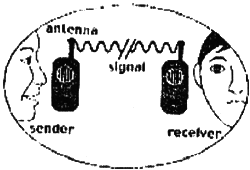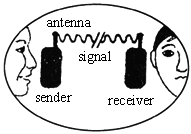题目内容
A mobile phone
(手机)is in fact a small radio. A radio sends a person's voice over a long way to another radio. A voice that is sent by radio is called a signal(信号). A radio signal travels very quickly.
Only a few years ago, mobile phones were very large. They needed large batteries
(电池). They had to be powerful(功率高)to send their signal to faraway places. This was because most cities had only one antenna tower(中继站)for mobile phones.Today's mobile phones are small and easy to use. Now most cities have a lot of antenna towers, not just one. This means that each mobile phone doesn't have to send its signal far away, so they don't need to be so powerful. Mobile phones today use small batteries. A large city, where lots of mobile phones are used, can have hundreds of towers.
Do you know what use a mobile phone has? Yes, you can use it to do a lot of things.
Call your friends and family from almost anywhere.
Call the police immediately if there is an accident in the street.
Send or receive e-mail.
Get information from the Internet.
Send and receive messages.
Sending short written messages is a popular way to use your mobile phone. Many people use short forms of words, so the messages are quick to write and read. Can you guess what these messages mean? Try reading them out. What do you hear?
RUOK?
CUL8R!
That's EZ !
Will I CU B4 2moro?
That's Gr8!
(1
)The writer talks about ________ uses of a mobile phone.[ ]
|
A .three |
B .five |
C .seven |
D .nine |
(2
)What does the writer think of today's mobile phones?[ ]
A
.They are small but very powerful.B
.They are very popular and cheap.C
.They are very easy for us to use.D
.They are big enough to send a signal.(3
)What does the writer write the article(文章)for?[ ]
A
.To give us some common knowledge of the mobile phone..B
.To introduce how the mobile phone works and what use it has.C
.To tell us what short forms of words mean in written messages.D
.To show us in what way the mobile phone is expected to develop.
 名师点睛字词句段篇系列答案
名师点睛字词句段篇系列答案
| |||||||||||||||||||||||||||||||||||||||||||||||||||||||||||||||||||||||||||||||||||||||||||||||||||||||||||||||||||||||||||||||||||||||||||||||||||||||||||||||||||||||||||||||||||||||||||||||||||||||||||||||||||||
| |||||||||||||||||||||||||||||||||||||||||||||||||||||||||||||||||||||||||




